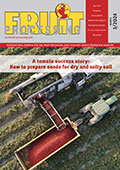The Danish aroma company, EvodiaBio, secured 6.4 million dollars in a recent capital raise. Their goal is to become a global industry leader in sustainable aroma production for the food and beverage industry.
EvodiaBio recently introduced a ground-breaking technology platform that uses precision fermentation to produce sustainable aromas for the food and beverage industry. Now, the ambitious company has secured 45 million Danish kroner in additional funding, equaling approximately USD 6.4 million.
EvodiaBio, founded just one-and-a-half-years ago, received 14 million kroner in financial support from the BioInnovation Institute, a Danish accelerator funded by the Novo Nordisk Foundation. The remaining 31 million kroner stem from several international industry players, including the German flavour house Symrise that steps in as strategic investor, and Nordic Foodtech VC is lead investor.
Jarne Elleholm, co-founder and chairman of EvodiaBio, sees the capital raise as a crucial step in reaching the company’s soaring ambitions. “Our vision is to create a sustainable, global company within the development, production, and commercialisation of natural aromatic substances and this funding is our opportunity to realise this vision. The funding was made possible by a strong support from the BioInnovation Institute and by the great progress we have made during our only one-and-a-half-year lifetime”, says Jarne Elleholm.
Non-alcoholic beer is the first segment that EvodiaBio will address, says Jarne Elleholm, as getting the taste of the beer right has been a major challenge for the brewing industry. The company’s newly developed aroma blend, called Yops, can improve the taste of non-alcoholic beer, and serves as a sustainable alternative to cultivated aroma hops. In the long term, the bio-industrial company will develop aromas for other beverages, perfume, and a range of other segments.
EvodiaBio’s monoterpenoid aromas are produced using yeast cells that secrete the individual aroma components and are then combined to mimic the aroma profiles of different hops. The result is a natural, pure, and sustainable product. The technology has been developed after years of research by the scientific co-founders, Prof. Sotirios Kampranis, Dr. Simon Dusséaux and Dr. Victor Forman. EvodiaBio’s approach surpasses all other methods and enables, for the first time, a cost-effective and sustainable biotechnological production of the volatile aroma molecules from hops. Using EvodiaBio’s solution, the brewer avoids depleting limited plant resources, while water and CO2 emissions are reduced by more than 90 percent.
Next step in EvodiaBio’s far-reaching plans is the establishment of the company’s own offices, laboratories, and pilot-production in Denmark. They are now preparing for the launch of Yops in 2023, where they also expect an increase in staff.
Facility expansion is part of a $100M Investment to enhance the delivery of essential health innovations to consumers
DuPont announced the opening of a new state-of-the-art probiotics fermentation unit at its Rochester, New York (USA), facility. Construction of the unit was completed in March as part of an overall $100MM investment to expand probiotics capacity. The facility is now producing high-quality probiotics for the dietary supplement and food and beverage industries, which have the potential to provide health benefits to consumers of all ages.
The state-of-the-art facility incorporates several new production innovations, including:
- The world’s largest fermenter for probiotics production and its downstream processing.
- A built-in, fully automated system of sensors and monitors that helps maintain optimal growing conditions, removing the need to take traditional manual samples.
- Pressurized air technology to mix fermenting solutions, replacing traditional pumps and mixing blades that can damage bacteria.
- New bacteria freezing technology for safe storage of the probiotics that significantly increases efficiency.
DuPont develops and produces a wide range of clinically-documented probiotic strains for products sold globally. In the United States alone, more than 16 million U.S. households are purchasing probiotics, which deliver a variety of functional health benefits – from digestive and immune health to promising advancements in weight management and even cognitive health. Specifically, HOWARU® Shape – which is part of the DuPont™ Danisco® portfolio – most recently won “Ingredient of the Year for Weight Management” at the NutraIngredients Asia Awards.
World’s largest probiotics fermentation unit is operational at the DuPont Rochester facility
DuPont announced it has completed construction on a new, state-of-the art probiotics fermentation unit at its Rochester, New York, facility. The unit, now largest in the world, is part of a multiphase nearly $100 million investment to expand probiotics capacity and enhance the company’s leadership in delivering high-quality, clinically documented probiotics to dietary supplement and food and beverage manufacturers.
The fermentation unit is fully operational and will serve as a crucial resource in propagating bacteria and enabling high potency, stability and efficacy of probiotics. Quality is extremely important in probiotic production, and the fermentation unit will also optimize DuPont’s production capability, enabling the company to increase the pace of delivery to customers and the market.
DuPont also completed a probiotics capacity expansion at its Madison, Wisconsin, facility in late 2018. The investment was used to upgrade equipment and increase the pace of new product development and significantly improved delivery times on pilot material for clinical trials and customer evaluations.
Fermentation, a practice stretching back more than 10,000 years of human history, employs beneficial microorganisms for enriching and preserving food ingredients. It remains firmly rooted in Asian and African cultures as a tradition passed down from generations. Consequently, fermented foods like Kimchi remain a staple in Korean cuisine, and cultured drinks like Kombucha and Lassi have an unabated following among Chinese and Indian consumers, respectively, says leading data and analytics company GlobalData.
On the other hand, fermented foods have largely been sidelined in Western diets partly due to the hyper-hygienic lifestyles, and the high affinity for processed, canned and pasteurized convenience-foods. This scenario is changing as fermentation once again comes under the spotlight in the West through the rising popularity of exotic Eastern foods and beverages like Kimchi, Kombucha and Kefir.
Health benefits: Bobby Verghese, Consumer Markets Analyst at GlobalData says, “Growing consumer awareness about the link between ‘gut health’ and overall health and wellness is a major factor driving the renewed focus on fermented foods.” Natural preservation techniques like fermentation are gaining ground in the backdrop of the ongoing shift of consumers from processed foods to ‘cleaner-label’ foods with less chemical preservatives. This is underscored by GlobalData Global Consumer Survey 2017 findings which reveal that 75 % of global consumers somewhat or completely agree with the statement that ‘artificial additives and preservatives are harmful to their health’.
Novel sensory experience: Fermented food and drinks offer novel taste and texture sensations which particularly appeal to youthful consumers who are on the lookout for emerging exotic and international cuisines. This reflects in the GlobalData Global Consumer Survey findings which states that 49 % of Millennial and Gen Z consumers like to experiment with new and unusual flavors while choosing food products.
Economic and sustainability aspects: Fermentation processes offer a cost-effective, energy-efficient, and zero-maintenance technology for food preservation. This technique enables efficient utilization of available resources by prolonging the shelf-life of perishable seasonal produce, upcycling food waste, and detoxifying raw materials. Consequently, fermentation holds the potential to make a substantial positive impact on global food wastage and food security.
Manufacturers can leverage fermentation to tap into the growing demand for healthier foods and drinks. For instance, in late 2016, Pepsi acquired branded Kombucha manufacturer, KeVita, to provide an additional option to consumers seeking a healthier alternative to sugary sodas. Fermentation also offers fish and meat producers a potent method for attaining clean label certification for their products without using harmful synthetic preservatives. The growing popularity of fermented foods implies the need for innovative and creative packaging formats that preserve the integrity of the live probiotic culture in the foodstuff, without sacrificing the convenience and aesthetics aspects. In addition, fermentation is making a mark on the cosmetics industry, where manufacturers are vying to develop natural and ‘clean’ beauty and personal care products that are as effective as synthetic formulations.
The new cold-tolerant hybrid strains developed by VTT Technical Research Centre of Finland enable fermentation at lower and higher temperatures than before. Production at lower temperature reduces the risk of contamination and possibly allows reduction of the use of sulphates. Modulating temperatures can be used to fine-tune product aroma.
In 2015 VTT generated the first new lager brewing yeast strains in 500 years, and has now applied the knowledge obtained to create new yeast strains for the production of wine and cider. A key characteristic of these strains is that they can tolerate a wide range of temperatures from 10 to 37 °C. Importantly, the low temperature range reduces the risk of contamination during fermentation, possibly allowing for reduced sulphate use.
The tolerance to higher temperatures facilitates large-scale production in active dry yeast form. The wines and ciders produced with these strains are characterized by an increased aromatic complexity.
The ability of a yeast strain to ferment efficiently at low temperature is a desired feature in alcoholic fermentation. Cold fermentations have been used for centuries in the production of lager beer with the lager yeast Saccharomyces pastorianus. The ability of this species to ferment at low temperature is a result of it being a hybrid between an ale yeast and the cold-tolerant wild yeast Saccharomyces eubayanus.
Scientists at VTT have now demonstrated that this combination of parents can also be effectively used for wine and cider fermentations. A wine yeast strain was crossed with the cold-tolerant parent of the lager yeast and the hybrids were tested for cider and wine fermentation.
The results showed that due to the wider range of temperatures tolerated by these species the aromatic properties of the cider and wine can be modulated by varying the fermentation temperature. White wine and cider, for example, benefit from low-temperature fermentations, both for reduced risk of contamination but also for an improved aromatic profile. Undesirable flavours that are typical of the wild parent are eliminated after hybridization and large-scale production is facilitated.
This natural, non-GM approach can be used for tailor-made generation of new strains by careful selection of the parent strains with desirable features. After being successfully applied to beer, wine and cider production, this technique is now being assessed for its use in the baking industry, where yeast must survive for extended periods in frozen dough.
The following organizations have funded the research: EU’s Marie Curie ITN Yeastcell-project, Academy of Finland and Alfred Kordelin Foundation.
References:
Krogerus, K., Magalhães, F., Vidgren, V. & Gibson, B. (2015) New lager yeast strains generated by interspecific hybridization. Journal of Industrial Microbiology and Biotechnology. http://link.springer.com/article/10.1007/s10295-015-1597-6
Magalhães F, Krogerus K, Vidgren V, Sandell M & Gibson B. (2017) Improved cider fermentation performance and quality with newly generated Saccharomyces cerevisiae × Saccharomyces eubayanus hybrids. Journal of Industrial Microbiology and Biotechnology. https://link.springer.com/article/10.1007/s10295-017-1947-7
Magalhães F, Krogerus K, Castillo S, Ortiz-Julien A, Dequin S & Gibson B. (2017) Exploring the potential of Saccharomyces eubayanus as a parent for new interspecies hybrid strains in winemaking. FEMS Yeast Research. DOI: 10.1093/femsyr/fox049









